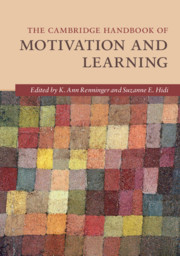Book contents
- The Cambridge Handbook of Motivation and Learning
- The Cambridge Handbook of Motivation and Learning
- Copyright page
- Epigraph
- Contents
- Figures
- Tables
- Contributors
- Foreword
- Acknowledgments
- Introduction Motivation and Its Relation to Learning
- Part I The Self and Its Impact
- Part II Rewards, Incentives, and Choice
- 6 Neuroscientific and Psychological Approaches to Incentives
- 7 Incentive Motivation
- 8 Attention, Information-Seeking, and Active Sampling
- 9 Open Digital Badges and Reward Structures
- 10 The Promise and Peril of Choosing for Motivation and Learning
- Part III Interest and Internal Motivation
- Part IV Curiosity and Boredom
- Part V Goals and Values
- Part VI Methods, Measures, and Perspective
- Index
- References
10 - The Promise and Peril of Choosing for Motivation and Learning
from Part II - Rewards, Incentives, and Choice
Published online by Cambridge University Press: 15 February 2019
- The Cambridge Handbook of Motivation and Learning
- The Cambridge Handbook of Motivation and Learning
- Copyright page
- Epigraph
- Contents
- Figures
- Tables
- Contributors
- Foreword
- Acknowledgments
- Introduction Motivation and Its Relation to Learning
- Part I The Self and Its Impact
- Part II Rewards, Incentives, and Choice
- 6 Neuroscientific and Psychological Approaches to Incentives
- 7 Incentive Motivation
- 8 Attention, Information-Seeking, and Active Sampling
- 9 Open Digital Badges and Reward Structures
- 10 The Promise and Peril of Choosing for Motivation and Learning
- Part III Interest and Internal Motivation
- Part IV Curiosity and Boredom
- Part V Goals and Values
- Part VI Methods, Measures, and Perspective
- Index
- References
Summary
In this chapter, an overview of the concept of choice provision and a discussion of the benefits and detriments of providing choice for motivation and learning in educational contexts is discussed. A review of the theoretical perspectives explaining how and why choice may have benefits, and sometimes detriments, is provided. In reviewing the relevant theories and the corresponding empirical evidence, we highlight a diverse set of perspectives – motivational, cognitive, social, and neuroscientific – to provide a nuanced understanding of the role of choice in educational settings. We focus the second half of the chapter on areas of contention within choice theory and research, including a discussion of the conceptual confluence of choice and autonomy and the various characteristics of individuals, tasks, choices, classrooms, and cultures that predict divergent choice effects. In closing the chapter, we discuss the implications of this research for educational practice and make recommendations for future research.
- Type
- Chapter
- Information
- The Cambridge Handbook of Motivation and Learning , pp. 238 - 262Publisher: Cambridge University PressPrint publication year: 2019
References
Accessibility information
- 8
- Cited by

